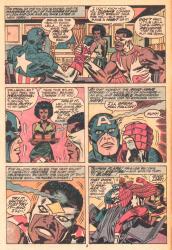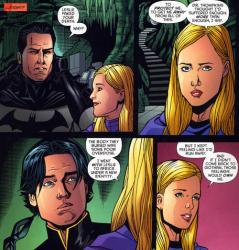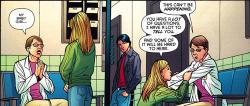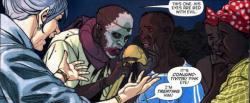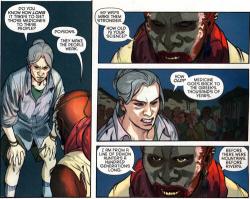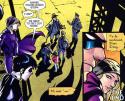It’s that time of year again, when people barbecue, swim in pools, chill with family, and generally have a good time. I’m stuck in faux-sunny San Francisco for the weekend, though, so all of y’all can eat it. Would it kill global warming to speed up a little bit? I don’t even sweat on hot days here.
Anyway, though, I had a pretty well received post about Captain America and America last year. It’s 2008 now. I’m older, wiser, and meaner. Why not give it another go, yeah?
I’ve been feeling a little nasty lately. Thinking about movies, news, music, and politics. Even comics, man. The presidential race turned into some ugly “My -ism is worse than yours” race, and I’m honestly tired of hearing about how Obama is going to change everything ever, particularly when he took father’s day to air out fathers, but whatever whatever. My point is that I’ve been waiting for an excuse to bite a face. So, you’ll have to pardon any cynicism that leaks through.
You could say that Captain America represents the American Dream. I say American Dream, but if you think about it, it’s really the ideal. Tolerance, perspective, patience, and so on. He thinks before he acts and he does his best to do right. He believes in his country and her people and trusts them to make the right choice. He chooses to lead by example.
If Captain America represents the American Ideal, Luke Cage is living proof that the dream is a valid possibility.
Carl Lucas is a victim of America. He grew up poor in Harlem, had no way out, and ended up running with a fake comic book gang. His childhood is a slideshow of group homes and juvie. He wises up when he gets grown and tries to go legit. His best friend, Stryker, stays dirty, though. Lucas makes the mistake of being the guy his best friend’s ex-girlfriend runs to, which angers Stryker. Stryker frames him, snitches, and Lucas goes to jail in Georgia for some reason.
In prison, Lucas is broken and angry. He doesn’t care about anything, basically, fights constantly, and eventually is used as a guinea pig for a new variant of the Super Soldier formula. A vengeful security guard sabotages the experiment, accidentally granting Cage enhanced strength and hard skin, and Cage escapes in the confusion. He goes back to New York and starts a new life as Luke Cage, hero for hire. He rebuilds his social circle, finds new love, and gets on with life.
Cage was put through a lot, most of it through no fault of his own.
Nine times out of ten, seems like, most Cage talk tends to be about how he once flew to Latveria to get two hundred bucks from Doom, tiaras, ha ha blaxploitation, and jokes about anal sex. He’s kind of a punchline, but I don’t think people realize how far he’s come.
Cage went from the kind of vaguely-insulting, heart-in-the-right-place black character that was popular back then (and kind of still is now) to the guy who took Captain America’s spot in the Avengers. I’m getting ahead of myself, though.
Part of the American Dream is that frontiersman, wild west work ethic. Staking your claim and all that. You take what’s yours and you refine it, beat it into shape, and make it work how it’s supposed to. Cage applied this to real life. He’s a hero for hire, yes, but that doesn’t mean he won’t work pro bono. There’s a scene in a Daredevil comic where Cage proves this. Luke tells Matt to use his senses to scan the building. Is there anyone selling drugs, being violent, or doing crime in his building? No. Why? ’cause Cage laid down the law.
There’s a line from a rap song that goes “Handle your business before your business handles you.” You can sit and wait for people to fix something for you and get screwed over in the process, or you can fix it yourself. Cage fixed it himself. He handled his business. He did the right thing.
This is something that most heroes do not do. They don’t take a firm hand in policing their area. They just kinda mill around and look for crime, or in Superman’s case, actively ignore things sometimes in the name of “letting people govern themselves.” The problem is, most people aren’t going to govern themselves. Some people do not have that choice or made the wrong choice.
Cage’s method of operating is very similar to how Frank Miller approaches Batman. It’s kind of a benevolent dictator move– he knows what’s right, and he’s going to implement it and you’re gonna benefit, whether you like it or not. He uses the Avengers to clean up a single neighborhood. He believes that heroes should be constantly making a difference, not just fighting supervillains. Superheroes should be visible and lead by example. This isn’t just about fighting crime– it’s about making the world better.
He eventually marries Jessica Jones after the birth of their daughter, Danielle. He begins to take heroing even more seriously after that. What’s the point of having powers if you aren’t going to leave the world a better place? What’s the point of having principles if you aren’t going to stick with them?
Why would you want your daughter to grow up thinking that you’re a coward?
This is part of why his split from Tony Stark is so believable. He thinks that Tony made the wrong choice. He can’t live with going along with that choice if it’s the wrong one, so he chooses to play outlaw instead. He’s doing it for the future and he’s doing it for his daughter.
So, Cage is out there every day, putting in work and doing the best he can. The only way to make it in America, for most people anyway, is through blood, sweat, and tears. You have to get dirty.
Cage is getting dirty. In the process, he’s risen above his beginnings, he’s cultivated a circle of loyal friends, he’s protecting his neighborhood, and he’s providing for his family.
Why is all of this remarkable? Why isn’t it just standard issue? Why should Cage be admired for doing the right thing?
(this is where the cynicism hits, y’all)
The thing about America is that she eats her young. It was founded on the idea of freedom, civil liberties, and making your own way in life. In reality, it didn’t even begin to seriously approach those lofty goals until the mid-1900s, almost two hundred years after it was founded. Even then, the political equivalent of baby steps were what happened, not long strides. It still isn’t 100%.
You’re on your own in America, a lot of the times. Look at the prisons, poverty, and education. You think everyone in prison is there because they’re a bad person? No, I’m willing to bet that a significant number are there because they didn’t have any other choice, so they picked up that gun or bat or kilo and went to work.
Think about it. Say you’ve got a family and your kid won’t stop crying because she’s hungry. You can either hope for a call back from that temp agency or you can hit the corner for a day or two and come home with a roll of twenties.
Now, keep thinking. What kind of a world is this where you have to seriously contemplate the idea of losing your family versus poisoning someone else’s? Could you make that choice? Is it right that you should ever have to make that choice?
This is what I mean. The American Dream should be a reality, but it is still a pipe dream for a lot of people. It shouldn’t be– but it is.
But, that’s life, right?
Well, yeah, it’s harsh, but that’s life. Life isn’t fair. America is not, and has never been, fair. Will it one day be fair? I’d like to think so. Will I see it? Probably not. But, that’s no excuse not to try and do right and behave as if it is.
This is why I love Cage so much. He has every reason to be bitter, full of hate, and furious at the life he’s found himself in. Instead, though, he’s just living his life, trying to do right, and leave it better for the next generation.
That, to me, is the only proper execution of the American Dream. You may feel like Atlas with the weight of the heavens on your shoulders, but your knees don’t buckle and your spine doesn’t bend. When America hurts you, you remind it that throwing a punch is an invitation to catch one right back.
Sometimes, when you love America, you have to fight America. Sometimes, you have to even dislike America, even though you love it.
Cage gets it right. He proves that the Dream exists. You just have to be willing to fight for it.
Happy 4th.


